7 Must-Read Books on How to Think Clearer
Unlock Your Mind’s Potential with These Bestsellers

Thinking, Fast and Slow by Daniel Kahneman

Thinking, Fast and Slow" is a groundbreaking book that was published in 2011. It challenges the traditional assumptions we have about how we think and offers a new perspective on the two systems that drive the way we process information. Written by Nobel Prize-winning economist, Daniel Kahneman, the book delves into the workings of our minds by exploring the two systems that drive our thought processes.
The first system, called the fast or intuitive system, operates quickly and automatically, enabling us to make rapid decisions without much effort. The second system, known as the slow or logical system, requires more effort and is involved in more complex decision-making processes. By examining these two systems, Kahneman highlights the strengths and weaknesses of each and explains how they interact with one another.
Throughout the book, Kahneman presents a range of experiments and examples to demonstrate how our thought processes are influenced by various factors such as emotion, bias, and context. He shows how our minds are not always reliable and that we often make decisions that are not in our best interest due to unconscious biases and cognitive errors.
"Thinking, Fast and Slow" offers a fresh and thought-provoking perspective on the way we think and make decisions. It provides valuable insights into the workings of the human mind and offers practical strategies for improving decision-making skills.
Nudge by Richard H. Thaler and Cass R. Sunstein
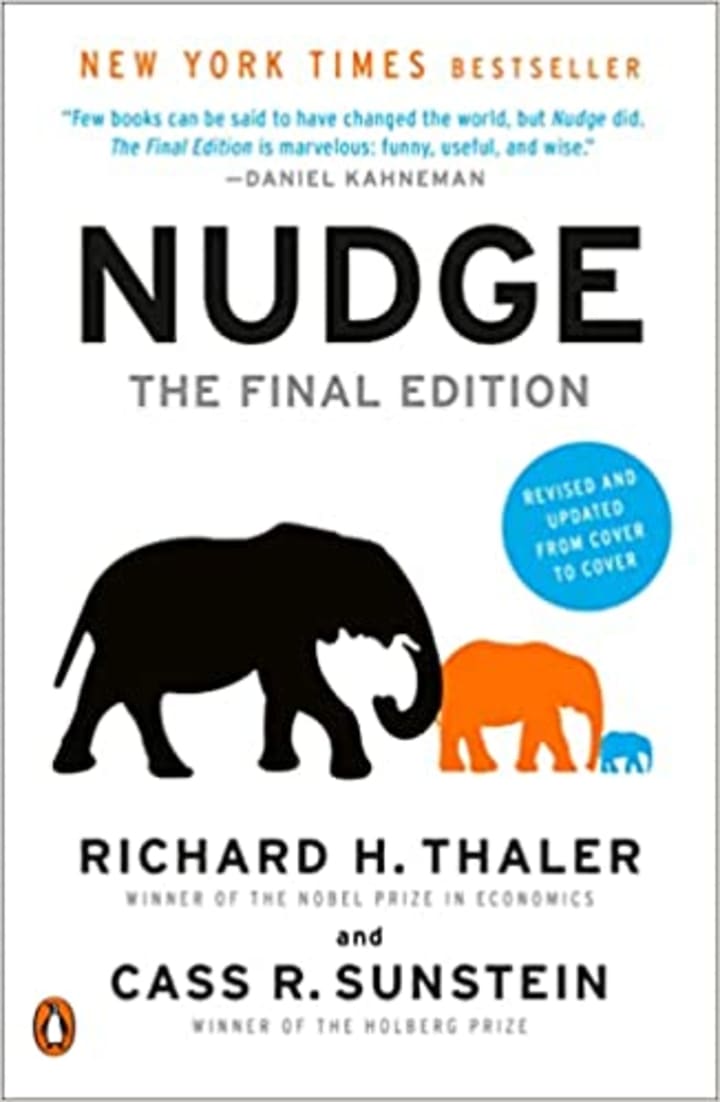
In the book "Nudge", Richard H. Thaler and Cass R. Sunstein introduce the idea of "choice architecture". Essentially, this concept refers to the way choices are presented to us and how they can influence our decisions. Thaler and Sunstein argue that by making small changes to the way choices are presented, we can encourage people to make better decisions without taking away their freedom of choice.
For example, the authors suggest that by placing healthier food options at eye level in a cafeteria, people may be more likely to choose these options over less healthy ones that are hidden away. This is an example of how the presentation of choices can nudge people towards making healthier decisions.
Another example is the use of default options. By making a certain choice the default option, people may be more likely to stick with that choice even if they have the option to change it. This can be used to encourage positive behaviors such as saving money or enrolling in retirement plans.
Thaler and Sunstein argue that these nudges are not manipulative, as people still have the freedom to choose, but they can be used to guide people towards better decisions. By understanding the way choices are presented and the impact they can have on our decisions, we can design choice architectures that encourage positive behaviors and improve outcomes for individuals and society as a whole.
Influence: The Psychology of Persuasion by Robert Cialdini
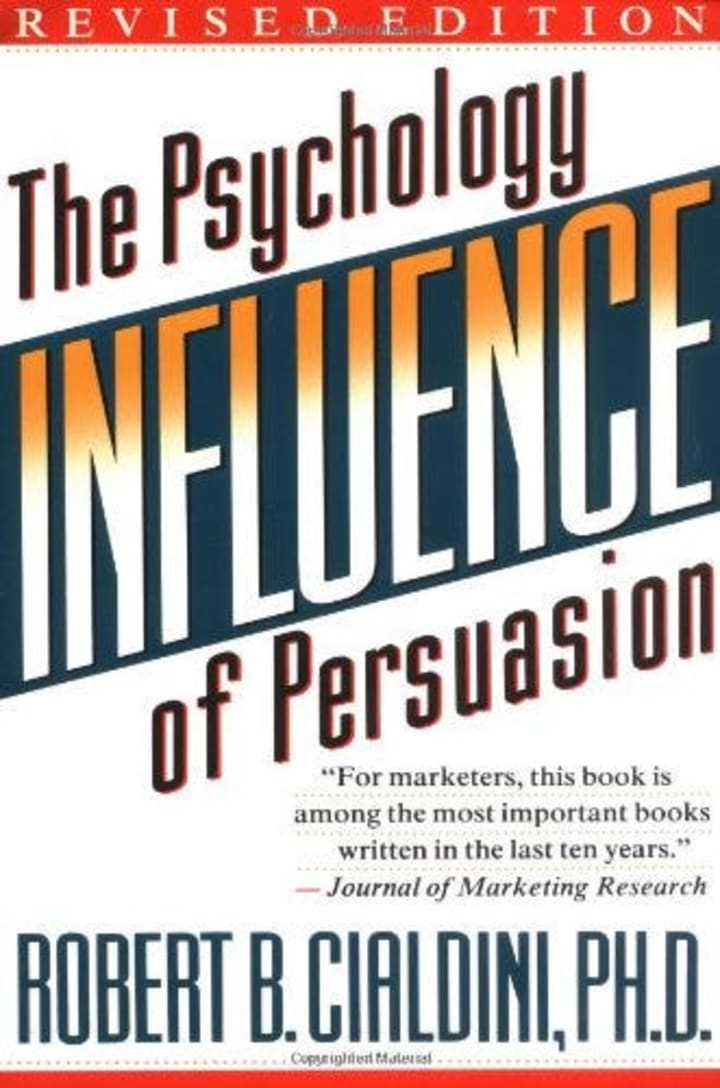
The book "Influence" by Robert Cialdini delves into the art and science of persuasion and how it can be used for both positive and negative outcomes. In his research, Cialdini identifies six key principles of influence: reciprocity, commitment and consistency, social proof, liking, authority, and scarcity. These principles provide a framework for understanding how people make decisions and how they can be influenced.
Reciprocity refers to the tendency for people to feel obligated to reciprocate when someone does something for them. Commitment and consistency relate to the idea that people are more likely to follow through on a decision if they have made a commitment to it. Social proof suggests that people are more likely to follow the crowd and make decisions based on the actions of others. Liking refers to the idea that people are more likely to say yes to those they like and trust. Authority relates to the tendency for people to comply with those in positions of authority. Finally, scarcity suggests that people are more likely to want something if they believe it is rare or hard to obtain.
Throughout the book, Cialdini provides examples and case studies to demonstrate how these principles can be used to influence our decisions in a variety of settings, from marketing to politics and even in our everyday lives. He also warns against the unethical use of these principles to manipulate people into making decisions that are not in their best interest.
Overall, "Influence" provides valuable insights into the science of persuasion and the ways in which we can be influenced by others. By understanding these principles, we can become more aware of the tactics being used to persuade us and make more informed decisions that align with our values and goals.
The Art of Thinking Clearly by Rolf Dobelli
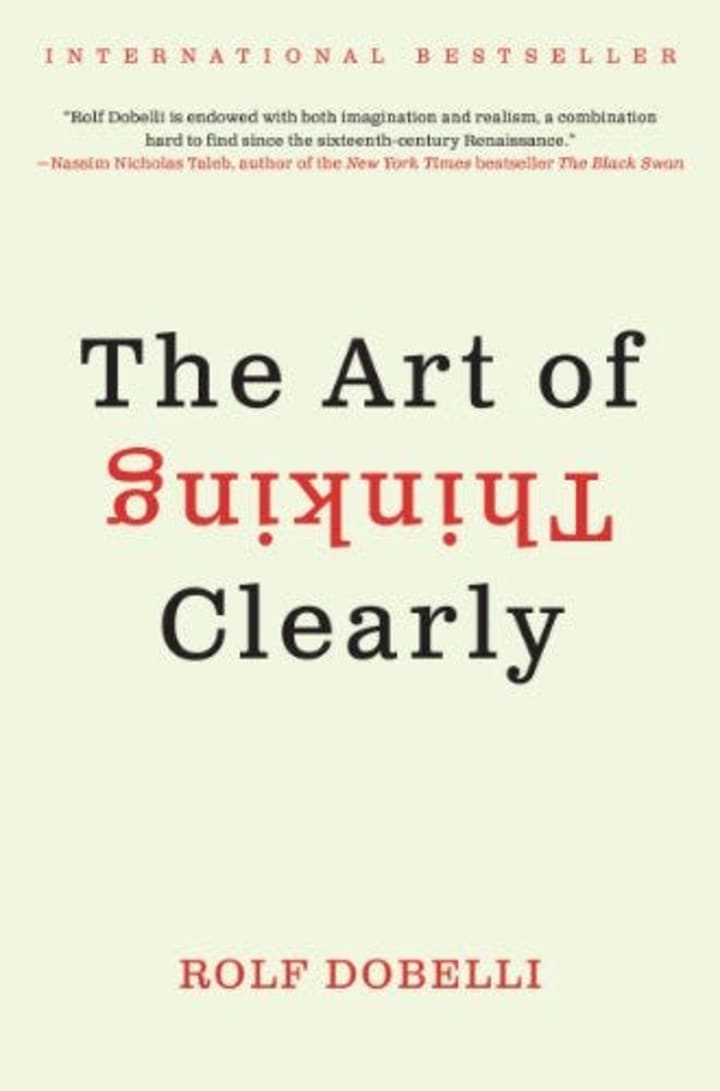
The Art of Thinking Clearly" by Rolf Dobelli is a book that comprises a series of concise essays discussing common thinking errors that people often make. Dobelli explains how these cognitive traps can affect our decision-making process and lead us astray. The book covers a range of topics such as confirmation bias, hindsight bias, and overconfidence, among others.
Confirmation bias, for instance, is the tendency to look for and interpret information that supports our existing beliefs, while disregarding information that contradicts them. Hindsight bias, on the other hand, is the tendency to view past events as more predictable than they actually were. These biases, and many others, can have a significant impact on our decision-making process and can result in faulty reasoning and incorrect conclusions.
Dobelli offers practical advice on how to avoid these thinking errors, such as seeking out diverse perspectives, challenging our assumptions, and being mindful of our own biases. By becoming more aware of these cognitive traps and learning how to overcome them, readers can improve their critical thinking skills and make better decisions in both their personal and professional lives.
Overall, "The Art of Thinking Clearly" is a valuable resource for anyone interested in improving their thinking and decision-making abilities. The book is written in a clear and engaging style and provides practical tips and insights that can be applied to various contexts.
Blink: The Power of Thinking Without Thinking by Malcolm Gladwell
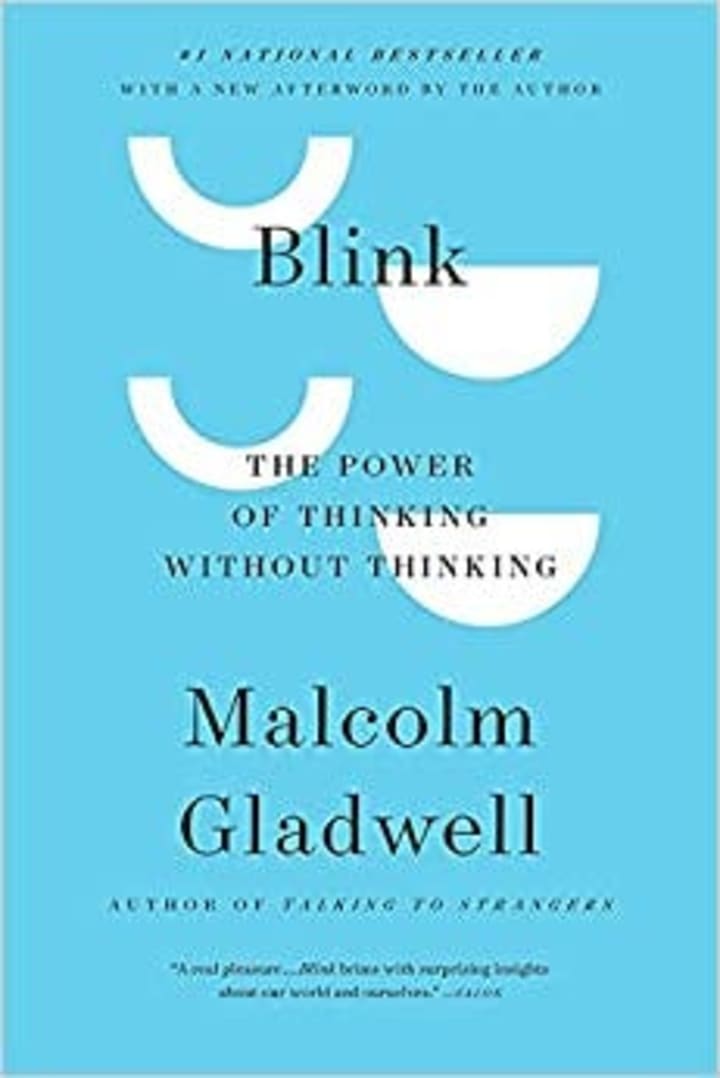
Blink" by Malcolm Gladwell is a thought-provoking book that explores the power of our unconscious mind and its influence on our decisions. The author argues that our gut instincts, or what he calls "thin-slicing," can be more accurate and reliable than our conscious reasoning, especially in situations where we have limited information or time.
Gladwell supports his argument with a range of case studies and experiments, including the story of an art expert who can instantly recognize a fake painting, and a police officer who was able to identify a suspect solely based on a brief glance. Gladwell argues that these examples demonstrate how our unconscious mind can process information and make accurate judgments in a fraction of a second.
However, Gladwell also acknowledges that our unconscious mind can be influenced by our biases and stereotypes, which can lead to incorrect judgments. He suggests that we can improve our ability to make accurate snap judgments by being aware of our biases and by practicing our intuition in safe, low-stakes situations.
Overall, "Blink" provides a fascinating exploration of the role of intuition and unconscious thinking in decision-making. It challenges the conventional wisdom that conscious, deliberate reasoning is always superior and highlights the importance of being attuned to our gut instincts. The book is a must-read for anyone interested in psychology, decision-making, and human behavior.
Predictably Irrational: The Hidden Forces That Shape Our Decisions by Dan Ariely
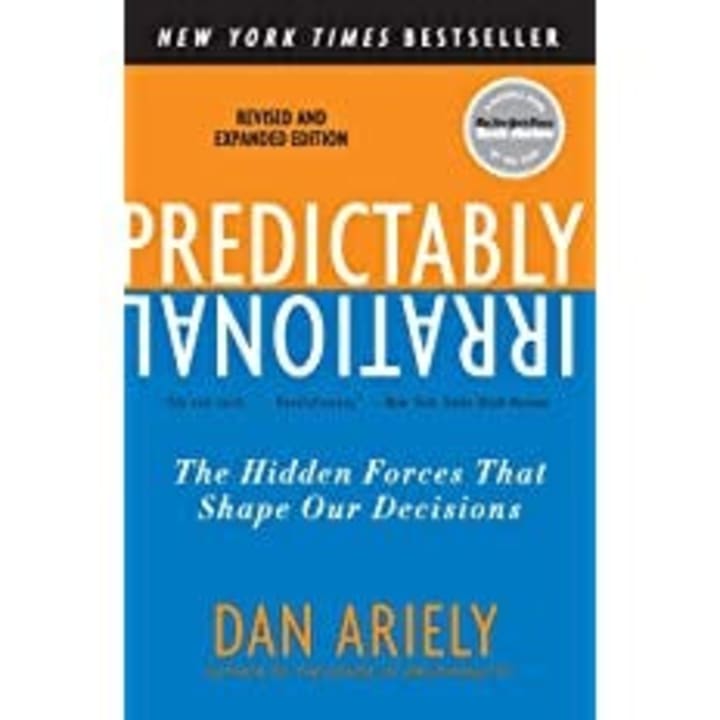
In Predictably Irrational," Dan Ariely delves into the underlying irrationalities that shape our decision-making process. Through a series of experiments and real-world examples, Ariely demonstrates how our behavior is often guided by factors that we are not consciously aware of, such as social norms, emotions, and cognitive biases.
One of the key themes of the book is the concept of "predictable irrationality," which refers to the recurring patterns of irrational behavior that we all exhibit. For example, we may be willing to pay more for a product simply because it has a higher price tag, or we may be tempted to make impulsive decisions based on the allure of freebies or incentives.
Ariely argues that understanding these patterns of irrational behavior is crucial for making better decisions and designing more effective policies and interventions. He suggests that by acknowledging and accounting for our cognitive biases, we can make more rational choices and avoid common pitfalls.
Overall, "Predictably Irrational" is a thought-provoking and engaging book that sheds light on the quirks of human behavior. It challenges our assumptions about rationality and provides practical insights into how we can make more informed decisions in our personal and professional lives. The book is a must-read for anyone interested in psychology, behavioral economics, or decision-making.
The Organized Mind: Thinking Straight in the Age of Information Overload by Daniel J. Levitin
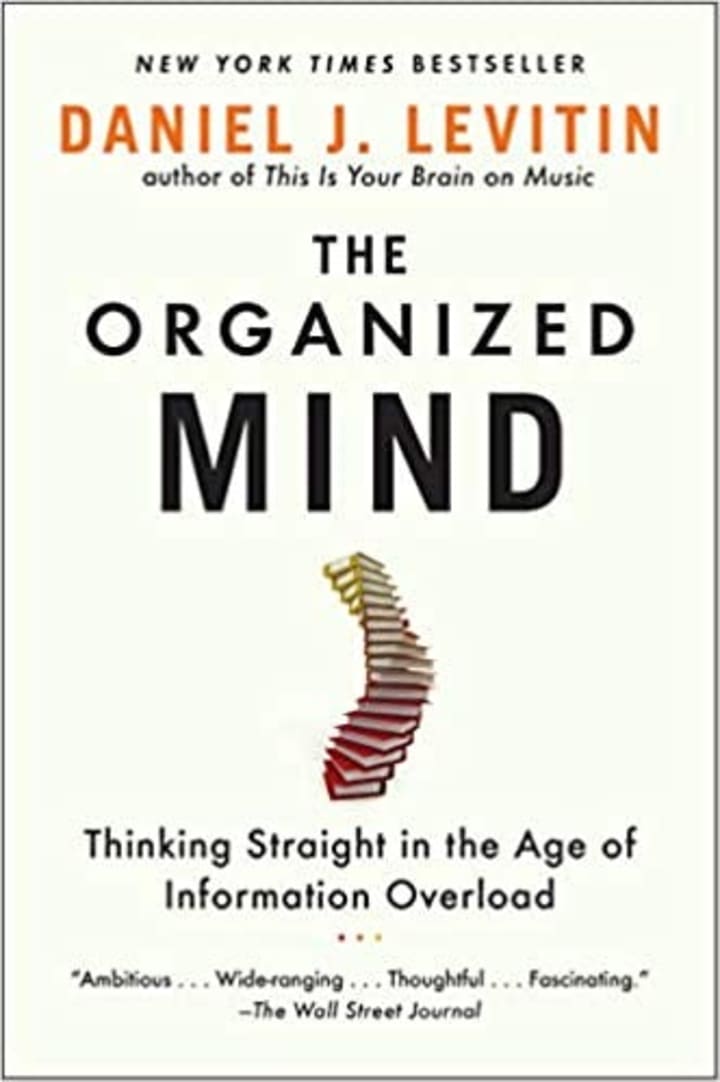
In "The Organized Mind," Daniel J. Levitin takes on the challenge of thinking and staying focused in the age of information overload. Drawing on his expertise in neuroscience, psychology, and organizational theory, Levitin explores the science behind how our brains process and manage information.
Through a series of practical tips and techniques, Levitin offers advice on how to reduce the cognitive overload that comes with our daily barrage of emails, social media notifications, and other distractions. He suggests that by adopting better organizational habits, such as breaking tasks into smaller steps and creating effective filing systems, we can reduce stress, boost productivity, and improve our overall mental clarity.
Levitin also highlights the importance of mindfulness and meditation as tools for managing stress and improving focus. By taking regular breaks, practicing relaxation techniques, and developing a regular meditation practice, we can reduce the impact of information overload on our mental health and well-being.
Overall, "The Organized Mind" is an insightful and practical guide to navigating the challenges of the digital age. It provides valuable insights into the science of information processing and offers practical strategies for improving productivity, reducing stress, and enhancing mental clarity. The book is a must-read for anyone looking to stay focused and organized in today's fast-paced world.
About the Creator
Think Move Strive
Are you looking for a reliable source of health and fitness information, product reviews, and buyer guides? Look no further. We are a team of Health & fitness experts dedicated to helping you live a healthy and active lifestyle.






Comments
There are no comments for this story
Be the first to respond and start the conversation.